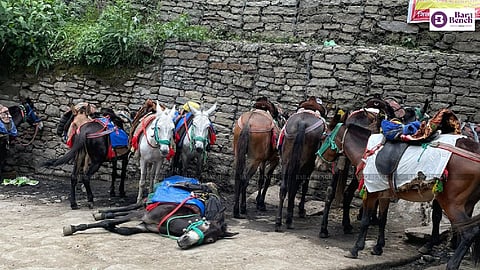
- Latest Legal News
- News
- Dealstreet
- Viewpoint
- Columns
- Interviews
- Law School
- Legal Jobs
- हिंदी
- ಕನ್ನಡ

The Uttarakhand High Court recently sought the response of the State government on a plea a highlighting the plight of horses, mules and other animals used for Char Dham pilgrimage.
A division bench of Acting Chief Justice Sanjaya Kumar Mishra and Justice Ramesh Chandra Khulbe issued notices to Uttarakhand government and district magistrates of Rudraprayag, Uttarkashi and Chamoli districts, where Char Dham shrines are located, and directed them to file their responses within two weeks.
The case will now be considered on June 22.
The plea, a public interest litigation (PIL) petition was filed by animal welfare activist Gauri Maulekhi seeking a direction to the government to halt the use of equines in Uttarakhand and its upper tracks for religious yatras/pilgrimages and to formulate an effective policy for use of equines in compliance with the applicable law.
Maulekhi told the Court that, at present, nearly 20,000 equines (horses, mules, donkeys and ponies) are used along various pilgrim tracks for ferrying people and carrying supplies in Rudraprayag town.
She added that the mismanagement of these equines in Uttarakhand has led to absolute mayhem and chaos on the tracks and is the direct result of a state of policy paralysis. The mismanagement often leads to animal cruelty, degradation of fragile ecosystems around holy shrine and public health hazard.
“Reports indicate that over 600 equines have perished in the past 2 months on the Kedarnath track alone. While this figure is conservative, several times as many are abandoned to die slow, agonising deaths from injuries due to unrelenting abuse on the pilgrim tracks in Uttarakhand. The animals transported to Uttarakhand are neither tested for zoonotic/communicable diseases and no endurance/treadmill test is conducted to ensure their fitness to work in extremely adverse conditions of the higher altitudes,” the plea said.
Sick and injured animals are seen working on the tracks until they collapse and die with no infrastructure or manpower for veterinary care at any point along the tracks, it was claimed.